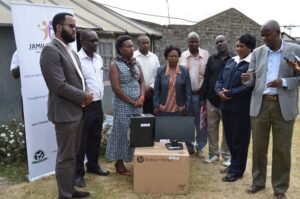
In one of the training sessions facilitated by MIDRIFT HURINET in Naivasha Sub County, a contextualized question was asked about how to assist a person who had undergone electoral-related violence in 1992, 1997, and 2007 and had been displaced by flooding during the COVID-19 period in 2020 in managing his mental health.
This opened up the conversation on Generational Trauma and how to manage it.
Generational trauma, also known as intergenerational trauma, is the passing down of deeply rooted emotional wounds, psychological distress, and behavioral patterns from one generation to another.
It often stems from historical atrocities, systemic oppression, war, forced displacement, or even deeply personal family traumas such as abuse, neglect, or addiction.
Unlike individual trauma, which affects a single person, generational trauma embeds itself within families and communities, shaping beliefs, fears, and coping mechanisms that persist over decades.
It is not just inherited through stories or cultural practices but also through epigenetics—scientific studies suggest that trauma can alter DNA expression, making descendants more susceptible to anxiety, depression, and heightened stress responses.
This trauma manifests in various ways, from unconscious fears and emotional repression to dysfunctional family dynamics and cycles of poverty or violence.
A grandchild of war survivors might struggle with anxiety without ever experiencing war firsthand.
At the same time, descendants of enslaved or colonized peoples may carry deep-seated mistrust or self-worth struggles influenced by their ancestors’ suffering.
In families, generational trauma often appears as patterns of abuse, addiction, or emotional detachment, repeated from parent to child, sometimes unknowingly.
Societal manifestations can be seen in marginalized communities, where historical injustices continue to impact access to resources, education, and mental health support.
It also manifests in the following scenarios;
Substance Abuse-Historical trauma can lead to maladaptive coping mechanisms, such as substance abuse, as individuals attempt to manage unresolved pain and stress. Many times, substance use issues are Intergenerational.
Gender-Based Violence and Femicide-Cultural norms rooted in patriarchal systems, exacerbated by historical injustices, contribute to the prevalence of gender-based violence.
The normalization of violence against women can be traced back to historical power imbalances and harmful gender roles.
Teen Pregnancies: Generational trauma can disrupt family structures and support systems, leading to a lack of guidance and education for young people. This absence increases vulnerability to early pregnancies, as adolescents may seek validation and affection in risky relationships.
Criminal Gang Activities-Marginalization and economic disparities, rooted in historical injustices, can push individuals toward gang involvement as a means of survival and identity formation.
Governance Issues and Poverty: Historical exploitation and mismanagement have led to entrenched poverty and distrust in governance structures.
This legacy contributes to ongoing economic challenges and perceptions of governmental neglect or corruption.
One of the most common misconceptions about healing from generational trauma is the belief that time alone will erase its effects or that simply ignoring the past will prevent it from influencing the future.
Many assume that if they didn’t directly experience the trauma, it shouldn’t impact them, dismissing the invisible ways it shapes emotions, relationships, and self-perception.
Others believe that healing is solely an individual journey, overlooking the communal and systemic nature of inherited pain.
Breaking the cycle requires more than just awareness—it demands intentional action.
The most important steps include acknowledging the trauma without shame, seeking therapy or spiritual guidance to process and reframe inherited narratives, and fostering open, honest conversations within families and communities.
Developing self-compassion and breaking destructive patterns—whether emotional avoidance, unhealthy coping mechanisms, or generational silence—is crucial.
Healing is a collective and courageous act, transforming pain into resilience and reclaiming the power to create a healthier legacy for future generations.
Healing from generational trauma requires a blend of self-awareness, emotional processing, and intentional change, all supported by powerful psychological tools.
Therapeutic approaches like cognitive-behavioral therapy (CBT) and trauma-informed therapy help individuals identify and reframe inherited negative beliefs, replacing fear-based narratives with empowerment.
Mindfulness and somatic healing techniques, such as meditation, deep breathing, and movement therapy, allow the body to release stored trauma, bridging the gap between emotional wounds and physical well-being.
Journaling and inner child work encourage deep reflection, helping individuals recognize patterns and reparent themselves with compassion.
Building a strong support system through family discussions, cultural reconnection, or community healing circles fosters collective resilience.
Most importantly, breaking cycles requires conscious daily choices—setting boundaries, practising self-care, and promoting emotional literacy to ensure that what was once passed down as pain is transformed into wisdom, strength, and renewal.
Generational trauma deeply shapes the way young people today form their identities, cope with stress, and build relationships, often in ways they don’t even realize.
Many inherit unspoken fears, perfectionist tendencies, or emotional suppression from parents and grandparents who survived hardship, learning to endure rather than express.
Their sense of self can be tangled with ancestral pain—whether it’s internalized oppression, fear of instability, or the burden of proving their worth.
In relationships, they may struggle with trust, emotional intimacy, or conflict resolution, unknowingly repeating the cycles they wish to escape.
Unlike previous generations, today’s youth face the unique challenge of breaking these patterns in a hyperconnected yet isolating digital world, where societal pressures and unrealistic healing portrayals can overwhelm the process.
They are also navigating uncharted territory—balancing cultural traditions with modern mental health awareness, challenging deeply ingrained family dynamics, and confronting systemic inequalities with tools their ancestors never had.
The challenge is immense, but so is their potential; armed with knowledge, therapy, and community dialogue, they have an unprecedented opportunity to transform inherited pain into a legacy of healing and empowerment.
By:Jacob Karani,Millie Rono,Chebet Motellin & Britney Marcella


